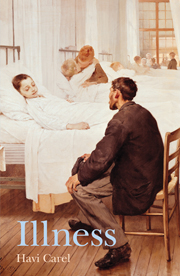Book contents
5 - Living in the present
Summary
What would you do if you were told you have a year to live? A month? A day? You would probably have very different plans for each scenario. Our diverse attitudes to life stem, in part, from our different estimates of how much time we have. Some people think that life is very long; that seven or eight decades of living are more than enough. Others believe that they would be happy if they could become immortal. Still others think that immortality would be intolerably boring. Each one of us has her own notions of time, mortality and the good life.
Moreover, the three are linked in ways that illuminate illness. As we saw in the previous chapter, you cannot have a good life if you are constantly plagued by fear of death. Other fears of what may happen in the future could trouble us, preventing us from living well in the present. Memories of a difficult past may also interfere with our present well-being. In this chapter I will show how our ideas about time and well-being are related and how certain philosophical views may lead us to a happier life, even if it is lived in the shadow of illness.
Let us begin with time. Is the average life span in the West, say seventy-five years, long or short? Do we have plenty of time or too little of it? Our experience of time depends on what we want to achieve and how much we are enjoying ourselves while doing it. If I wanted to dig a tunnel to the other side of the earth using a spoon, an average life span would be too short for achieving this aim. If I wanted simply to enjoy myself, have a good time, eat nice food and so on, it wouldn’t matter very much if I did these things for twenty, fifty or a hundred years (assuming that the level of enjoyment is the same throughout my adult life). So life is not long or short; it is long or short relative to what we want to do. Some projects require many decades, others are short-lived.
- Type
- Chapter
- Information
- Illness , pp. 141 - 156Publisher: Acumen PublishingPrint publication year: 2013



